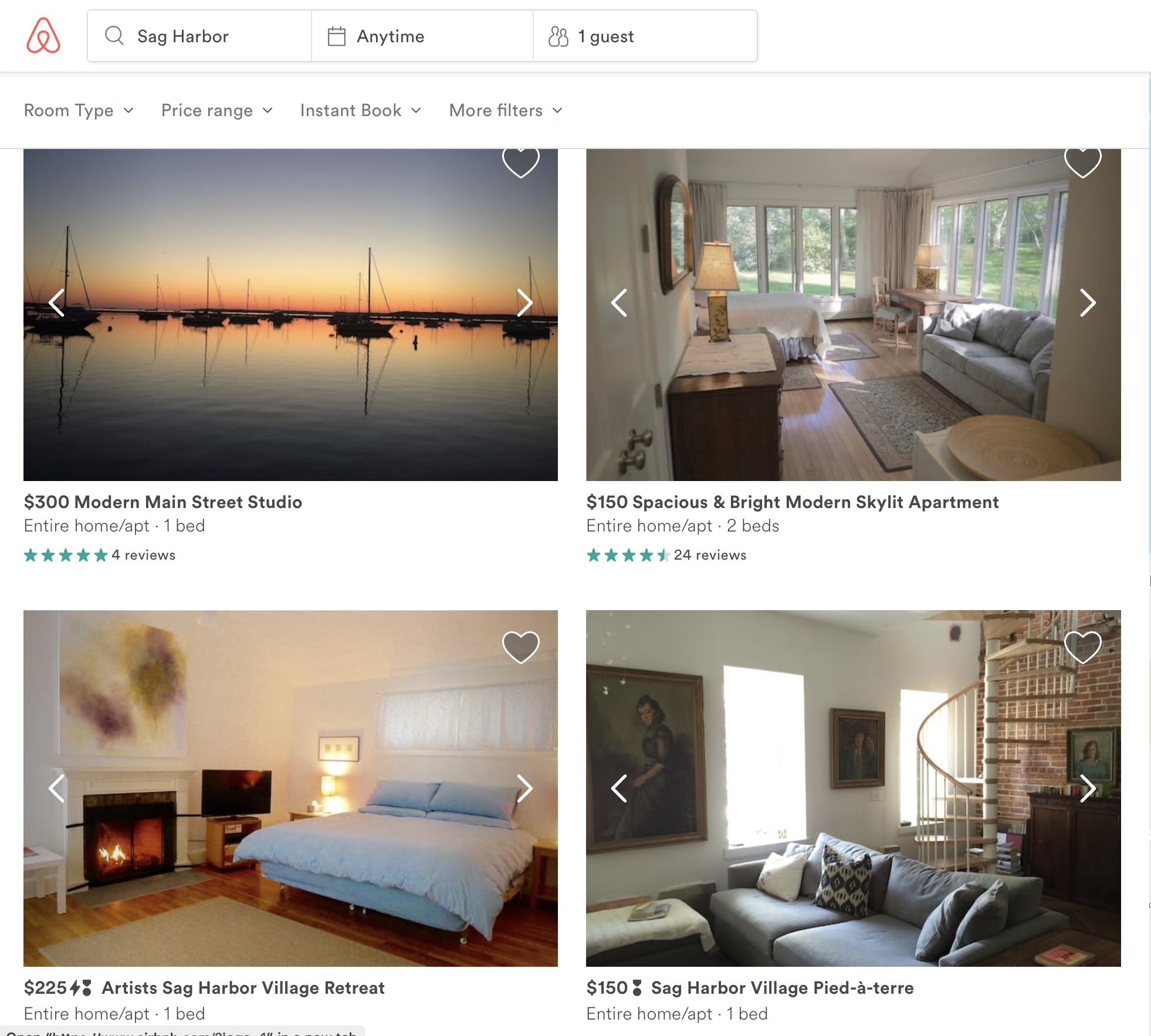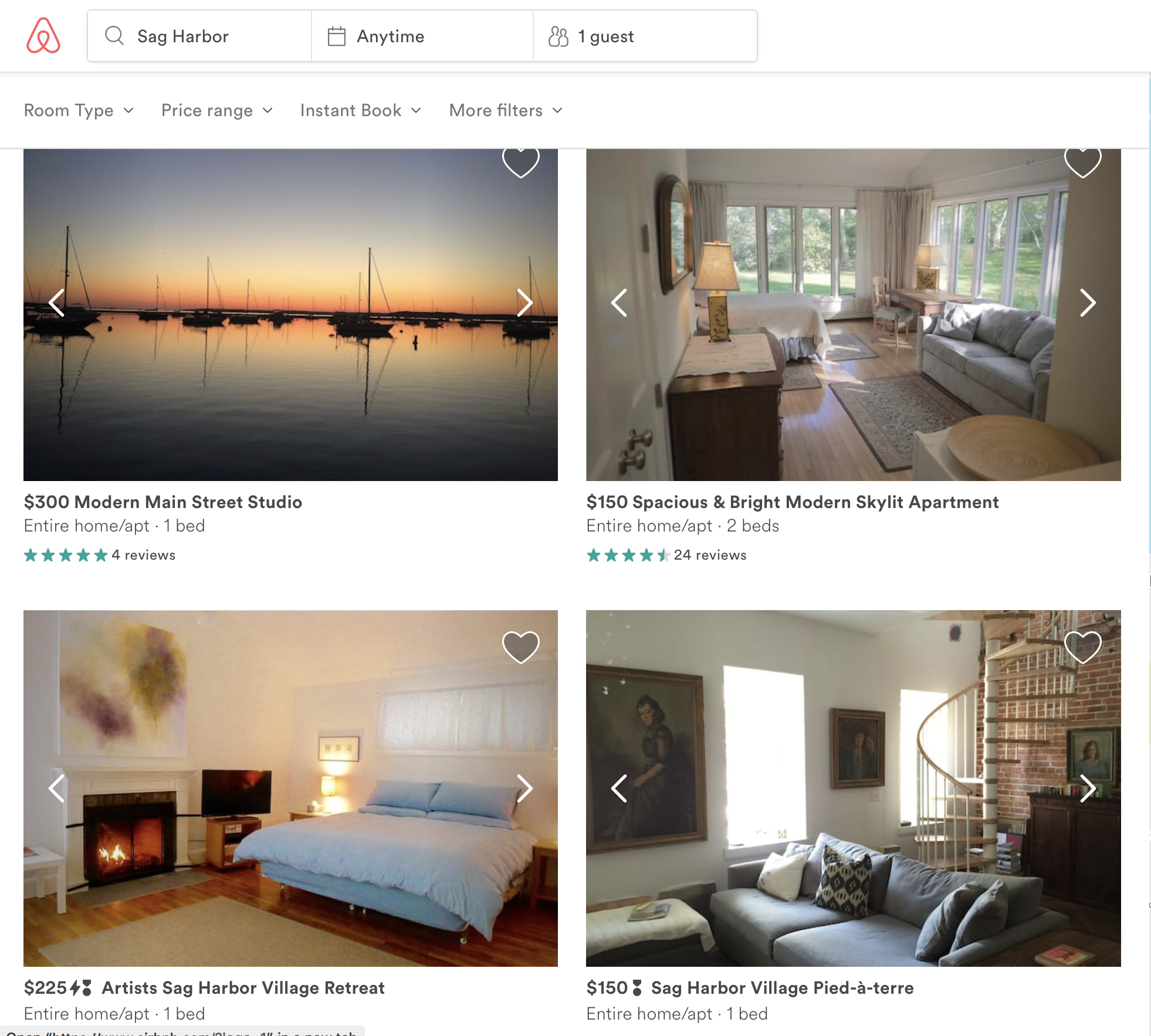
[caption id="attachment_64710" align="alignnone" width="1962"] A screen shot from an Airbnb search of Sag Harbor.[/caption]
A screen shot from an Airbnb search of Sag Harbor.[/caption]
By Stephen J. Kotz
Type in “Sag Harbor, NY” at airbnb.com, and up pop 17 pages of rental listings, ranging from single rooms in private homes for just $75 a night to entire houses for $1,000 to $1,500 a night.
Granted, not all the listed accommodations are in the village proper, but with 18 listings per page, a visitor looking for a place to spend a weekend, week or even longer has a vast selection of choices. The online rental site, and others like it, offer everything from bayfront cottages and Main Street colonial homes, to sprawling houses, with pools, of course, tucked away in the woods that practically shout out: summer share house!
The availability of such short-term rentals, which often fall between the cracks as local municipalities try to bring the practice under control, has caught the attention of motel owners across the state, including Nathaniel Egosi, the owner of the Sag Harbor Inn in the village.
“You have cash deals, no insurance and nobody collecting taxes,” he said. “And you have zero compliance with the code.”
Mr. Egosi, who said his business was down “in the high single digits” because of competition from online rentals, painted a picture in which quiet residential streets in Sag Harbor and other East End communities are being overrun by tourists renting private homes and turning neighborhoods into de facto commercial districts, where parking becomes a premium, trash and litter pile up, and year-rounders are subjected to late night noise from visitors’ parties or even just nocturnal comings and goings.
“Freedom is fine as long as it doesn’t impact anyone else,” he said. “In our society we have zoning and regulations that allow people who spend a tremendous amount of money on property taxes to have certain expectations.”
But Adrian Stivala, who recently became manager of the Forever Bungalow cottages on Route 114 just outside the village, said he had grown up as part of the generation that had made use of Airbnb, Uber, and other aps. “It’s safe to say it has taken away what could be potential clientele,” he said, “but to me it’s just another outlet for people.”
State lawmakers are also taking notice. In early May, State Senator Rich Funke, who represents the Rochester area, filed a bill in the Senate that would prohibit the rental of private homes for periods of less than 30 days if the landlord was not present unless sales and motel taxes are collected and the property owner had proof of liability insurance. There would be exemptions for property owners who earned less than $2,500 a year from their rentals.
In a memorandum accompanying his bill, Senator Funke said it was largely an effort to “level the playing field” between private homeowners who rent their homes and motels and hotels that are regulated.
Mr. Egosi said besides being required to provide secure accommodations and a host of employees to staff the front desk, clean rooms, and perform other tasks, motels are required to collect sales tax (8.625 percent in Suffolk County), and an additional 3-percent county room occupancy tax.
New York State Assemblyman Fred W. Thiele Jr. this week said a similar measure had been introduced by Assemblywoman Patricia Fahey, who represents a district in the Albany area.
“The complaint I get from hotels and motels primarily comes down to taxes,” said Mr. Thiele. “The airbnb people are not collecting it.” Mr. Thiele said Ms. Fahey’s bill, which was just introduced last week, had yet to be debated, but he questioned whether a state law was needed to remedy the problem.
“In my opinion, this is primarily a zoning issue, and local towns, villages, and cities all have zoning power and regulate this now.”
That was part of the approach East Hampton Town took last year when it adopted a rental registry that limits short-term rentals. A homeowner is now allowed to rent their house for less than two weeks twice in any six-month period. When rentals are advertised homeowners are required to include their rental registry number in the ad.
East Hampton Supervisor Larry Cantwell said in its first year the rental registry saw more than 3,500 residents sign up. At a minimum, he said, it has provided an important baseline of data to code enforcement officers. Using online rental sites is legal in the town, provided the rentals themselves meet the code, he said.
“There’s nothing new about summer rentals. Many homeowners have relied on them to provide a little extra income or put the kids through college,” he said. “What’s new is that these short-term rentals have created havoc in the neighborhoods.”
David Betts, East Hampton Town’s public safety director, agreed the registry has helped the town enforce the code and served as a deterrent to people trying to get around the short-term rental limits, but he noted that others have quickly learned to work around the law.
“We’re seeing a lot more 15-day rentals than we did in the past,” he said as homeowners simply rent for one more day than the minimum allowed by the law.
Sag Harbor Mayor Sandra Schroeder said the issue of short-term rentals had been brought to her attention by a number of neighborhood groups, but said she had not seen a groundswell of opposition. “I know what it’s like to have to pay the mortgage,” she said, “but we are going to have to see if there has been a severe impact in our village.” One step the village has already taken, she added, is to set up regulations for bed and breakfasts in the village code.
While it has done that, no one has yet to register their home as a bed and breakfast, according to building inspector Tom Preiato. Although the village does not have a rental code per se, he said short-term rentals like those offered through Airbnb are prohibited, although enforcement would require someone making a complaint about the activity.
Southampton Town Supervisor Jay Schneiderman said a ban on short-term rentals tries to apply “a one size-fits-all solution” to a problem that is more complex.
He said someone could rent their house for two weeks or less to a family that was quiet and respectful, or they could rent it to an individual for the entire summer who threw noisy parties every weekend. “The focus has to be on people who disturb their neighbors,” he said, suggesting it was more a matter of providing better code enforcement than imposing an outright prohibition on short-term rentals.